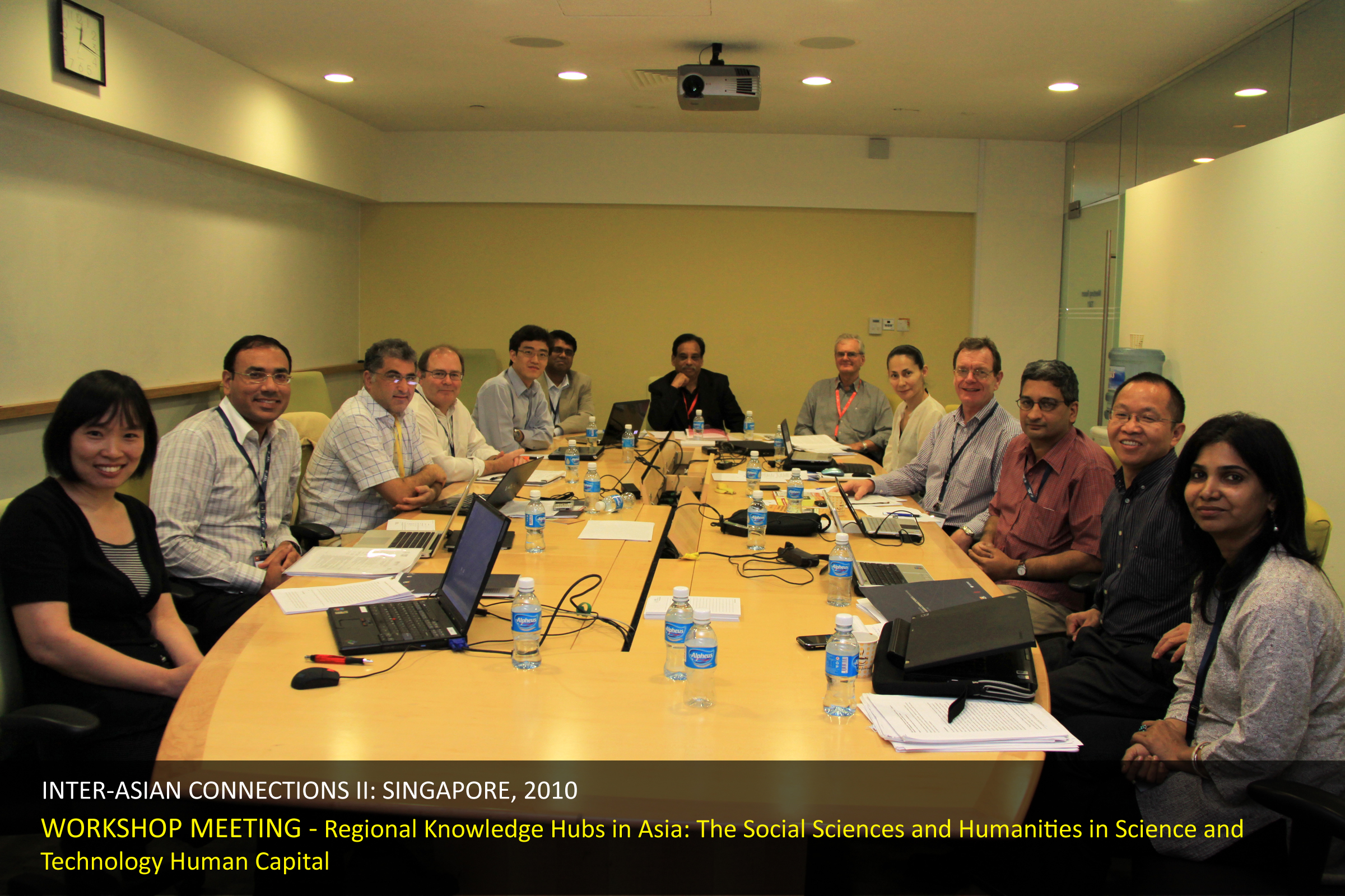- This event has passed.

Workshop Directors
V.V. Krishna
National University of Singapore
arivvk@nus.edu.sg
Tim Turpin
University of Western Sydney
t.turpin@uws.edu.au
Workshop Participants
Mohan V. Avvari, Associate Professor, Business School, University of Nottingham – Malaysia Campus; Isshamuddin Ismail (in absentia), General Manager of Strategic Planning with Pahang BioScience, Kuala Lumpur; and K. Thiruchelvam (in absentia), Associate Professor and Head of the Department of Science and Technology Studies at the Faculty of Science, University of Malaya
“Inter-Organisational Networks emerging in a Greenfield Cluster – A Study in Malaysia’s Multimedia Super Corridor Cluster”
Chuanxing Wang, Associate Professor School of Political Science and International Relations and Vice Director of Center for America Studies, Tongji University
“The Structural Power Based on Innovation Systems and the Comeback of East Asia”
Sam Garrett-Jones, Associate Professor and Acting Head of School (Management), School of Management and Marketing, University of Wollongong
“The Role of Collective Learning in the Development of Innovative Local Organizations and Regions”
Mei-Chih Hu, Associate Professor, Institute of Technology Management, National Tsing Hua University
“Knowledge Flows in Taiwan’s Hsinchu Regional Innovation System”
Kathryn Ibata-Arens, Associate Professor, Department of Political Science, DePaul University
“University Incubators as Hubs of Innovative Ecosystems: Bamboo Networks and Best Practice in Start-Up Business Incubation Management”
Sangeeta Kamat, Associate Professor, Education Policy Studies/International Education, University of Massachusetts at Amherst
“Neoliberalism, Urbanism and the Competition State: Producing Hyderabad as a ‘knowledge city’”
Tae-Ho Kim, D. Kim Foundation Postdoctoral Fellow for History of Science and Technology in East Asia, Center for Korean Research and Weatherhead East Asian Institute, Columbia University
“A Tale of Two Cities: Comparison of Two Industrial Knowledge Hubs in 1960s’ North and 1980s’ South Korea”
Balaji Parthasarathy, Associate Professor, International Institute of Information Technology, Bangalore
“The Emergence and Transformation of Bangalore, India, as a ‘Knowledge Hub’”
Naubahar Sharif, Assistant Professor, Division of Social Science, The Hong Kong University of Science and Technology and Erik Baark (in absentia), Professor of Social Science and Environment, The Hong Kong University of Science and Technology
“From trade hub to knowledge hub: The role of Hong Kong’s innovation system in linking southern China to global markets”
Mark Wilson, Associate Director, School of Planning, Design and Construction and Professor of Urban and Regional Planning, Michigan State University and Kenneth E. Corey (in absentia), Professor, Department of Geography, Michigan State University
“Planning and Policy Action for Knowledge Hubs in Asia”
Call for Workshop Papers
Global competitiveness is dependent on the capacity of economies to acquire knowledge capital and to apply new knowledge through a highly trained and specialised workforce. The term ‘knowledge-based’ or ‘learning economy’ has emerged to describe those economies in which the production, distribution and use of knowledge are the main drivers of growth, wealth creation and employment across all industrial sectors. The concept of a knowledge-based economy has sometimes been used to make a contrast between so called ‘new’ economies based on new technologies, from ‘old’ economies based on long established products and process.
However, a knowledge-based economy is not simply one that emphasises new technologies or even new knowledge. A knowledge-based economy is one in which all sectors are knowledge intensive, are responsive to new ideas and technological change, are innovative, and employ highly skilled personnel engaged in on-going learning. In short, knowledge and skills have to be useable and used in the production of all manner of goods and services.
Our conceptualization of a knowledge hub is that it comprises an ensemble of knowledge-intensive organisations located in both public and private sectors. Some are research-intensive knowledge producers, such as research institutes or universities. Others are demanding knowledge users, including firms but also service providers such as hospitals. The knowledge-users provide a focus for knowledge-generation, transmission and diffusion. Producers and users are closely connected and, while spatial proximity is important, they do not have to be physically co-located. Moreover, because of their social and economic characteristics, knowledge hubs draw on the social sciences and humanities in the course of their development.
Knowledge hubs have three key functions. They generate new basic knowledge of relevance to many industries, both old and new. The impact of this knowledge is not necessarily direct, nor immediate. But it is influential. In addition, they also generate applied knowledge that is directly and immediately relevant to local industries. Secondly, knowledge hubs capture (and participate in creating) knowledge generated elsewhere, nationally or internationally, and develop this further to meet specific local needs. A third function is to transmit knowledge through educational institutions such as universities and schools but also through life-long learning processing that involve firms, community based institutions and a variety of government agencies and services including hospitals, clinics and professional associations.
With the rapid economic development of the Chinese and Indian economies and the growth of the newly industrialized Asia economies, there is evidence of newly emerging knowledge hubs across the Asia region. In some cases these are concentrated in specific fields such as biotechnology or ICT in Singapore. In others there is evidence of a relocation of existing knowledge hubs in areas such as mining technologies moving from North America to Australia and South Africa. However, we understand very little about the dynamics behind this process, or the way different disciplines, especially the social sciences and humanities, intersect through the process and the implications for national innovation systems.
This gives rise to four key questions to be addressed by the workshop. (1)Does the movement of science and technology human capital precede or follow such developments? (2.) What is the role of social science and humanities researchers in STHC? (3) How important is the local availability of personnel in anchoring a newly emerging knowledge hub? (4) What are the institutional imperatives for supporting such development? (and (5) in what ways are newly emerging hubs remaining linked to other global centres of knowledge?

 Events
Events